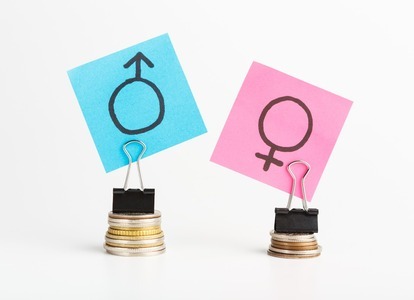
The gender pay gap has remained stubbornly wide for decades, and it doesn’t appear to be closing, despite a recent rush of legislation and directives aimed at bringing greater transparency. Recent news reports have revealed that The Walt Disney Company, one of the biggest and best-known companies in the world, has come under fire for allegedly underpaying its female employees in California since 2015, on average 2% less than men doing equivalent jobs.
Closer to home, King Charles and Queen Camilla have been criticised after figures revealed a huge gender pay gap between staff. Figures from the latest Sovereign Grant report show King Charles’s private secretary Sir Clive Alderton receives more than double what Camilla’s ‘right-hand woman’ Sophie Densham is paid. The report, which lists a breakdown of royal expenditures, listed Sir Clive’s salary as £205,000-£210,000, whilst Ms Densham is paid around £90,000-£95,000.
Earlier this year, according to The Guardian analysis of the government’s gender pay gap reporting, it was revealed that four out of five companies and organisations in Great Britain still pay their male employees more than their female ones. The median pay gap remains stubbornly wide at 9.4% – the same level as back in 2017-18, when employers were first required to publish the information. The gap remains larger in the public sector at 15.1%. This compares with 8% in the private sector, and both are broadly similar to last year’s figures.
In almost half of companies and public bodies, male employees are paid at least 10% more than their female counterparts. Only one in 10 pay female and male employees equivalent wages (where the difference is zero or less than 0.5% in either direction).
It’s not a very encouraging picture. When we take a closer look at how these findings stack up in corporate comms, it’s no better.
Findings from our annual Salary Guide 2023 revealed, sadly, that women in corporate communications are paid less than men – and the gap is closing painfully slowly.
Overall, men are currently being paid 15% more in their base pay than their female counterparts. The survey found that in-house men are taking home 11% more in pay than women. In the agencies, the gap is even bigger, with men taking home a staggering 24% more than women. Things don’t look any rosier when it comes to bonuses, with men out-earning women by an average of 6%.
The average pay increase for women was 10% compared with 9% for their male counterparts. This 1-percentage point is only a tiny step in the right direction when you consider the enormous disparity.
At current rates of progress, it will take more than 20 years to close the gender pay gap. In a female-dominant industry that’s focused on reputation management, we have to ask why employers are not making greater efforts to level the playing field. When we take a closer look at total remuneration – base and bonus combined – men are earning on average a shocking 21% more than women. We have conversations with women about this very issue every week. Women put a lot of value on flexibility, and now hybrid working practices have become well established, giving more flexibility and balance, perhaps women will start to feel they’re in a stronger position to push for market rate salaries.
We recognise that the gender pay gap is a complex issue influenced by various factors such as discrimination, age, working hours, parenthood (including time away from the workforce), the desire for flexible work, education and the types of jobs held by men and women. Additionally, women are more likely to work more conventional hours due to responsibilities outside of work, limiting their ability to spend their evenings networking to secure new business, for example. The lack of continuity in work experience, stemming from traditional patterns of women temporarily leaving the workforce during their childbearing years, also contributes to lower pay for women. They often miss out on pay rises and bonuses whilst on maternity leave. Moreover, employers' reliance on prior salary history in hiring and compensation decisions can perpetuate pay discrimination from job to job.
Even when we take these factors into account, salaries and bonuses between the sexes still aren't square. If we are to see meaningful progress on closing the pervasive pay gap, employers must go further than simple data sharing. Every employer needs to create a meaningful action plan which sets out how they will improve gender equality in their workplace. Many do, and we have heard of progress being made, but it is not yet widespread.
While salary transparency is a hugely important step towards creating a more equitable culture, women are still more likely to feel that negotiating their pay may be perceived negatively by their employer. Men are confident, women are worried – and this directly impacts pay. This needs to change.
We find that women, when negotiating salary, fear being rejected, can lack confidence, and worry about being seen as ‘pushy’ at the risk of damaging their career. They like to show that they are doing a great job and hope to be recognised for it. Men, on the other hand, feel overwhelmingly confident, and know their worth; they are confident that asking for a pay rise won’t affect their career and it will improve how they are perceived.
Companies serious about valuing their employees must take more proactive action to close the gap. Rewarding men for being more confident in negotiation is inexcusable – businesses need to be accountable for addressing these imbalances, looking at workplace equity more holistically and providing employees with the tools and opportunities to achieve their full value and potential.
We urge any woman who hasn’t asked for a pay increase to just do it – especially when they know that their pay is below market rate. After all, no one is forcing employers to level up the salaries across their business, especially if they don’t need to report their remuneration. It will cost them more and impact profit so there is little incentive – unless women start speaking up.
Employers and employees alike need to make a firm commitment to identifying and addressing the pay gap and in turn, driving a sustained, inclusive culture through greater diversity and sense of belonging.
Closing the gap is not straightforward, but it’s not impossible. It’s high time to stop minding it and instead mend the gap!
To download a copy of The Works Search Salary Guide 2023, click here.
For a free download of our full Annual Salary Guide 2023, click here.
Time for a change? Check out our latest jobs!
The Works Search: a search consultancy specialising in PR and corporate communications. We have unrivalled matching abilities and are known for finding the top 5% performers in the industry - the ones who deliver and make your reputation great. For more advice or market insights, do get in touch with us on 0207 903 9291 or email: sarah@the-works.co.uk.


